Onizuka Visitor Center on the Slopes of Mauna Kea
Mauna Kea Onizuka Visitor Center
Located at the 9200′ point on the slopes of 13,803′ Mauna Kea, the Onizuka Visitor Information Station makes for a great spot to acclimate to the altitude. Altitude sickness is a real possibility for those who continue on to the summit and it is suggested that anyone planning on doing so, spend at least a half hour at the visitor center.
Caution: It is recommended that anyone who has gone scuba diving in the previous 24-hrs do not visit the Onizuka Visitor Center or go to the summit, as the bends is a real, potential hazard. For a list of additional health hazards and precautions to take, visit www.ifa.hawaii.edu/info/vis/visiting-mauna-kea/health-and-safety-advisories.html.
On our recent visit to the Big Island, this was one of the few things on our “to-do list” that we haven’t done before. The much maligned, but much improved Saddle-Road that runs between Hilo and Waimea (Kamuela) makes the drive from Hilo a pleasant one, even though your vehicle may do a lot of down-shifting as you go from near sea-level to over 9000′ in just over an hour. [The drive takes about twice as long if you’re driving from the Kailua-Kona area.] Once placed on the “do not go” list of car rental companies, it is no longer an obstacle.
The view alone would make taking this drive along the Saddle Road worthwhile, as you get a unique perspective of Mauna Loa and Mauna Kea from the valley (the “Saddle”) that is formed between them. I would suggest leaving early enough to allow for at least a two-hour drive, if you’re leaving out of the Kailua-Kona area, to get to the Onizuka Visitor Center. If you plan to go to the summit, allow a half hour acclimation period there, then another 15-20 minutes for the drive to the summit.
Then, on your way back down, stopping for the star-gazing program. You’ll easily spend half an hour to a full hour gazing through the various telescopes that they have set up on the patio.
We got a late start and a longer stop at the Akatsuka Orchid Gardens than anticipated, so we did not get to do the summit on this visit…gives us something to look forward to on a future visit. We got to the visitor center with 15 minutes till sunset and we did manage to climb a small hill nearby, which many do to get a beautiful view of the sun going down. [Note: It gets dark and cold fairly quickly once the sun goes down, so a flashlight would be a good idea.]
Nightly Star-Gazing Program
Temperatures dropped from the 50’sF to the mid- 40’sF and the breeze picked up after dark, as well. There is a nightly star-gazing program hosted by volunteers who man telescopes on the patio of the Onizuka Visitor Center. We got great looks at the moon and a crash course in constellation location and identification. It is a very informative and entertaining presentation, although it is helpful if you are somewhat familiar with constellations to begin with.
It should be noted that the breeze naturally accelerates after sunset, so dress accordingly as you will definitely feel the wind-chill affect! There isn’t a lot of refreshments available to keep you warm…i.e. no coffee! They do have a pot of hot water and will sell you some instant hot cocoa mix for a dollar inside. It helps raise funds to keep this operation going, not to mention give you something warm in your belly!
If you plan on visiting and seeing Mauna Kea up-close, allow for a stop at the Onizuka Visitors Center and it is always a good idea to get the latest weather update and check on road conditions. Simply call, (808) 935-6268 for a recorded message on current conditions.
For more information on Mauna Kea, here are a few books to consider:
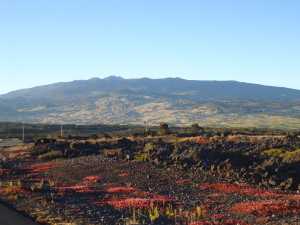
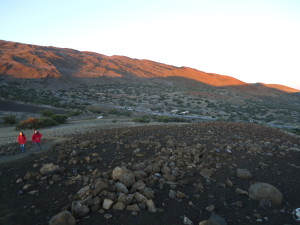
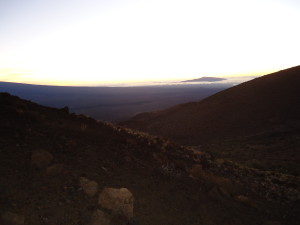
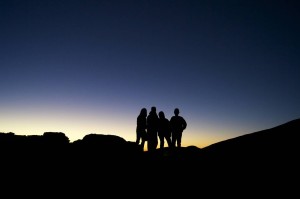
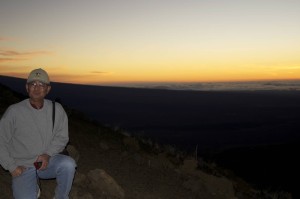




No Comments »
RSS feed for comments on this post. TrackBack URL